


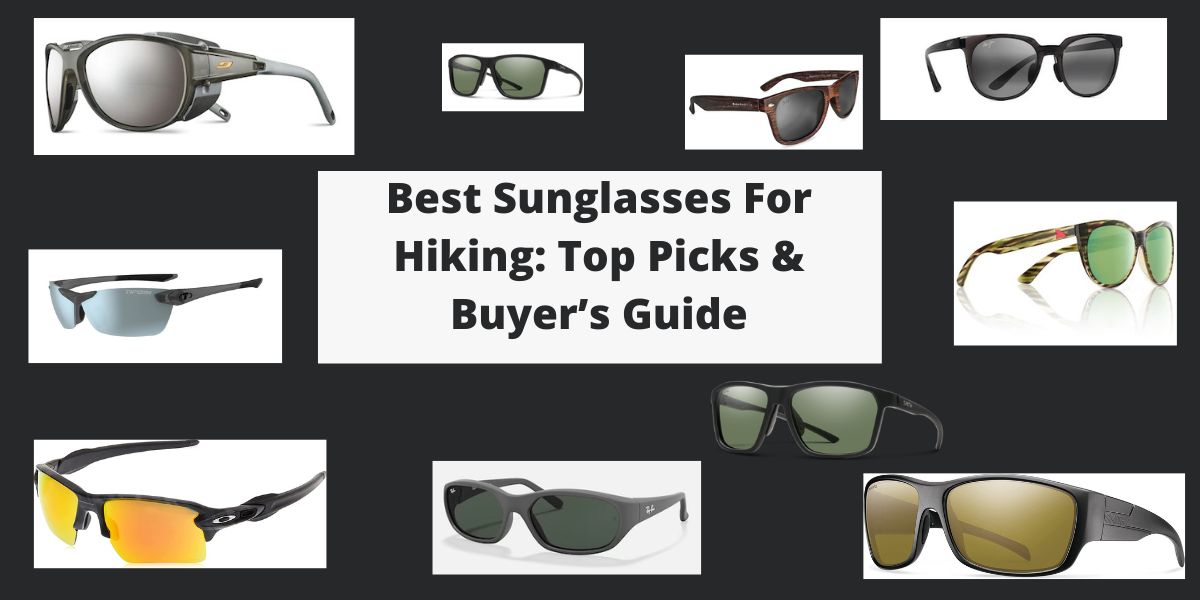
Unless you’re hiking at night, you should wear sunglasses while you hike. Sunglasses are vital for protecting your eyes from UV radiation. They can help with trail hazards like debris and low-hanging brush, and are part of the 10 Essentials for Hiking.
However, there are thousands of sunglasses designs, and not all of them are suitable for hiking. Here, we will teach you everything you need to know to choose the best sunglasses for hiking that are comfortable enough for everyday wear.
Whether you’re choosing sunglasses for daily use or for your outdoor adventures, there are a lot of design elements to consider. For outdoor sunglasses, you want sunglasses that are:
Here are how the different elements of sunglasses design impact their suitability for hiking.
You want sunglasses that will stay on your head as you move. This means choosing the right width of frame and looking for options like nose pads, rubberized earpieces, and arms that are long enough to sit on your ear comfortably. They also should be loose enough that you aren’t getting marks on your nose, your temple, or your ears quickly while wearing.
Choose a sunglasses design that has good eye coverage. Wrap-around sunglasses are some of the best options because they don’t have side openings that let in light. Aviator-style and Wayfarer-style sunglasses are also good due to the large lens size and venting that prevents fogging. Smaller round lenses might be fashionable, but they don’t provide enough protection for hiking. Heavy sweating can cause wraparound sunglasses to fog easier, which should be a consideration for the glasses you choose on a given day.
Sunglasses need to protect your eyes in more ways than one. First, sunglasses can protect your eyes from dust and debris. Secondly, sunglasses protect your eyes from UV radiation. Prolonged exposure to UV radiation can damage the eyes and increase the risk of conditions such as cataracts, macular degeneration, and skin cancer.
When looking for UV protection in sunglasses, check for the following indications of UV protection:
Polarized lenses are the best for outdoor activities. They reduce glare, make it easier to see, and can reduce eye strain.
Polarized sunglasses work well because they reduce the glare from reflected light (like off of snow, puddles, or bodies of water). If you want more information about how they work, read our guide to polarized sunglasses and our article about mirrored and polarized sunglasses. If you’re hiking in the snow or near water, polarized lenses are a must-have– and honestly, you’ll probably enjoy their benefits in any and all outdoor settings.
There are many color options available for polarized and non-polarized sunglasses, and each lens color filters light differently. We have a complete guide to sunglasses lens colors, but here is a quick summary of each lens color and what it does. Having sunglasses where you can swap lenses, or multiple pairs to choose from is generally a good idea to get the best performance out of your shades.
| Lens Color | Benefits |
| Blue and Purple |
|
| Brown and Amber |
|
| Gray |
|
| Green |
|
| Red and Pink |
|
| Yellow, Orange, and Gold |
|
The lenses in your sunglasses can be made out of glass or a variety of plastic materials. Both glass and plastic lenses work well for hiking.
| Glass Lenses | Plastic Lenses | |
| Optical Clarity | Very good | Depends on the type of plastic |
| Scratch Resistance | More resistant | Less resistant |
| Impact Resistance | Resistant, but may chip or shatter from extreme impact | Less resistant, but will likely crack instead of shatter |
| Drop Resistance | May shatter from an extreme fall | Much more resistant |
| UV Protection | Can effectively block UV rays without additional coating or treatment | Requires treatment or special coating to block UV rays |
| Weight | Heavier than plastic | Very light |
| Price | Usually more expensive | Can be less expensive; however, high-performance plastics can be more expensive than glass lenses |
While it is your preference to use glass or plastic lenses, many hikers prefer plastic lenses because the sunglasses are lighter, more comfortable, and less likely to slip when you get sweaty.
Here is how some of the most common types of plastic used for sunglasses lenses compare to each other. Note that all plastic lenses require filters or coatings for UV protection, so no one type of plastic has an advantage over the others in that regard.
| Nylon | Acrylic | Polycarbonate | Trivex | |
| Optical Clarity | Great | Good | Lower than other plastics | Great |
| Scratch Resistance | Good | Poor | OK | Good |
| Impact Resistance | Great | OK | Great | Great |
| Drop Resistance | Great | OK | Great | Great |
| Weight | Lightest | Lightweight | Lightweight | Extremely lightweight |
| Notes | Less common (and therefore more expensive) than other types of plastic lenses | Usually the least expensive type of lens | Relatively thin, frequently used in wrap-around designs | More expensive than other plastic lens materials |
Now that you know what elements are important for choosing hiking sunglasses, here is our guide to some of the best shades on the market.
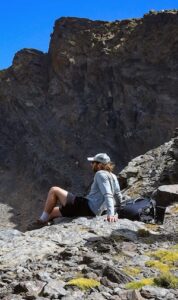
Costa Del Mar Rinconcito’s on Mulhacen in Spain
These scratch-resistant lenses are great for bright light conditions, and a top pick for activities near water. The lenses have several light filtering options built in, including blue light and harsh yellow light. These might be our all time favorite sunglasses for fishing, but we use them heavily on hikes as well. They are incredibly clear, durable, comfortable, and have just enough venting to avoid fogging on runs or hot days.
It is worth noting that any Costa Del Mar pair of glasses will perform great, and you have lots of different frame options to choose from.
Buy at Costa del Mar | Buy on Amazon

Redfin Amelia sunglasses on the summit of Mount Of The Holy Cross, a Colorado 14er
We’ve personally taken the Redfin Amelia sunglasses fishing, backcountry skiing, mountaineering, and trail running. We found these sunglasses to be extremely comfortable; their low profile means they fit great under hats, gaiters, and more. We love the blend of comfort, ventilation, yet semi closed frame, and the extremely high clarity lenses. It would be hard for us to choose a favorite between Redfin and Costas.
It is worth noting that any pair of Redfin glasses will perform great, and you have several frame options to choose from.
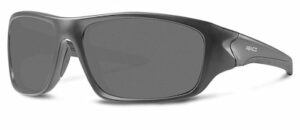 The Abaco Radman sunglasses’ wrap-around design offers your eyes a high degree of protection from UV radiation and visible light. These glasses are meant to have a tight fit that some people, especially those with larger heads, may find a bit uncomfortable at first– but once you’re used to them, you’ll hardly notice they’re there. You can also find other more open frame designs on both the Abaco site and on Amazon.
The Abaco Radman sunglasses’ wrap-around design offers your eyes a high degree of protection from UV radiation and visible light. These glasses are meant to have a tight fit that some people, especially those with larger heads, may find a bit uncomfortable at first– but once you’re used to them, you’ll hardly notice they’re there. You can also find other more open frame designs on both the Abaco site and on Amazon.
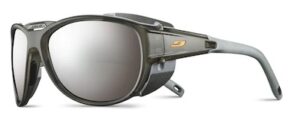 Designed for mountaineering, these sunglasses are extremely durable. Their side shields cut down on glare, and their brown Reactiv lens option is designed to enhance contrast and color in the brightest conditions. The Reactiv lenses also automatically transition from lighter to darker depending on the amount of UV light present.
Designed for mountaineering, these sunglasses are extremely durable. Their side shields cut down on glare, and their brown Reactiv lens option is designed to enhance contrast and color in the brightest conditions. The Reactiv lenses also automatically transition from lighter to darker depending on the amount of UV light present.
These glasses are specifically designed for mountaineering, making them one of the ultimate choices for hikers in all seasons.
Buy at Julbo | Buy on Backcountry | Buy on Amazon
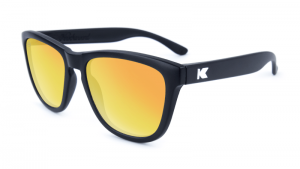 If you need a durable pair of hiking sunglasses that won’t break the bank, look no further than the Knockaround Classics. These sunglasses are designed to be durable and lightweight, offering good eye protection for a great price.
If you need a durable pair of hiking sunglasses that won’t break the bank, look no further than the Knockaround Classics. These sunglasses are designed to be durable and lightweight, offering good eye protection for a great price.
When we just started getting into fly fishing and were on a tight budget, knockarounds were our go to. They simply work, they look good, and don’t break the bank. The lenses may degrade over time, but they easily will last you longer than a year if you take good care of them.
Buy at Knockaround | Buy on Amazon
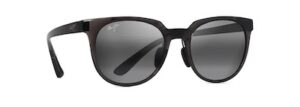
These are the lightest sunglasses we’ve found that can stand up to the demands of the trail. Maui Jim makes durable, scratch-resistant sunglasses that offer great UV protection. Their unique hybrid lenses combine the best of both glass and plastic (good clarity, yet great durability and lightweight). The frames are open allowing for great ventilation, but also sunlight from the side which should be a consideration.
Buy at Maui Jim | Buy on Amazon
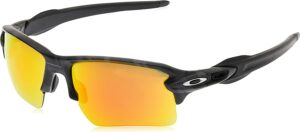 These extremely rugged sunglasses are highly resistant to shock and drops, scratches, impact, and anything else you could throw at them. Oakley’s sunglasses are all highly engineered for top of the line protection during extreme conditions.
These extremely rugged sunglasses are highly resistant to shock and drops, scratches, impact, and anything else you could throw at them. Oakley’s sunglasses are all highly engineered for top of the line protection during extreme conditions.
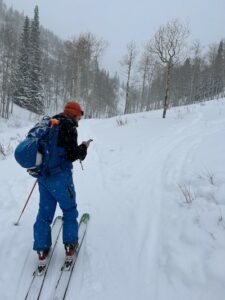
Ombraz while backcountry skiing
Ombraz sunglasses are armless, which means that they fasten to your head by an adjustable strap. The result is a comfortable pair of sunglasses that are going to stay on your face, no matter what. Because these are a different style, these glasses will be absolutely loved by some, and will take some getting used to for others.
We love them for activities where glasses can easily fall off, like backcountry skiing, or for activities where you need your glasses on the entire day. These are super versatile since you can purchase them with side shields turning them into great mountaineering / winter hiking glasses.
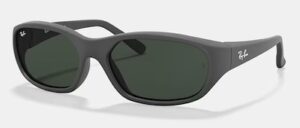 These wrap-around shades might not have the classic Ray-Ban shape, but that makes them even better for hiking. These lightweight shades offer extremely high optical clarity and complete UV protection. It is a mid range sunglass price for high end optics (we like value).
These wrap-around shades might not have the classic Ray-Ban shape, but that makes them even better for hiking. These lightweight shades offer extremely high optical clarity and complete UV protection. It is a mid range sunglass price for high end optics (we like value).
Buy at Ray-Ban | Buy on Amazon
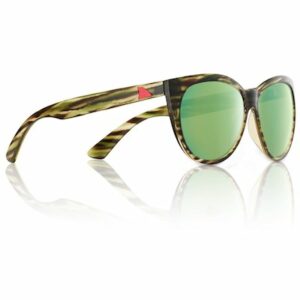 Similar to the Amelia sunglasses but with a smaller head shape in mind, the Key Largo sunglasses have all the great features we’ve come to expect from RedFin. They fit well and have a similar low profile. If you want a more open design, this is what we would recommend.
Similar to the Amelia sunglasses but with a smaller head shape in mind, the Key Largo sunglasses have all the great features we’ve come to expect from RedFin. They fit well and have a similar low profile. If you want a more open design, this is what we would recommend.
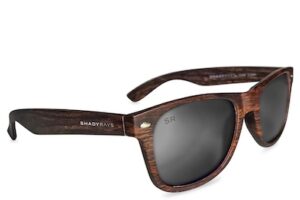
The Shady Ray’s Classic sunglasses are a great option for hiking due to their large lenses, deep tints, and durability. Their polycarbonate lenses are scratch, shatter, and saltwater resistant to keep you safe and on the trail. We used our first pair of Shady Rays after finding them on the ground! After that, we bought several other pairs, and even gifted them to others.
Why? They are affordable, high quality, and the lost and broken replacement policy is perfect for the outdoor adventurer. There are tons of frame color and lens color options making it easy to get the style and function you want.
Buy at Shady Ray’s | Buy on Dicks Sporting Goods
 Fashionable enough for daily wear but tough enough for hiking, the Frontman Elites are highly impact-resistant, lightweight, and comfortable. They have several lens options, including their ChromaPop lenses for high color fidelity. Smith makes incredible gear, and they are trusted by pro athletes and outdoor guides in most sports.
Fashionable enough for daily wear but tough enough for hiking, the Frontman Elites are highly impact-resistant, lightweight, and comfortable. They have several lens options, including their ChromaPop lenses for high color fidelity. Smith makes incredible gear, and they are trusted by pro athletes and outdoor guides in most sports.
Buy at Smith Optics | Buy on Amazon
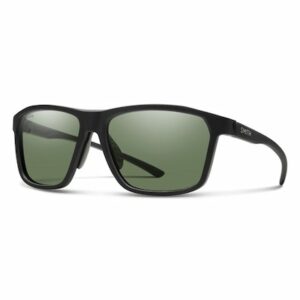 Smith Optics’ ChromaPop lenses are great optics for hiking sunglasses. They have excellent color fidelity and let you see the landscape around you just as it is. These sunglasses are a great option for hiking– especially in dappled shadow and high contrast conditions, like hiking in a deep forest or a canyon.
Smith Optics’ ChromaPop lenses are great optics for hiking sunglasses. They have excellent color fidelity and let you see the landscape around you just as it is. These sunglasses are a great option for hiking– especially in dappled shadow and high contrast conditions, like hiking in a deep forest or a canyon.
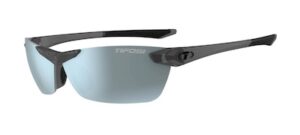 The Seek 2.0’s lenses perform just as well as more expensive options, and this option really shines is in summer. Their ear and nose grips are made of a unique hydrophilic rubber. These sunglasses don’t slip– in fact, their fit and grip improves as you sweat. If you are looking for an inexpensive and comfortable pair, this is a great option.
The Seek 2.0’s lenses perform just as well as more expensive options, and this option really shines is in summer. Their ear and nose grips are made of a unique hydrophilic rubber. These sunglasses don’t slip– in fact, their fit and grip improves as you sweat. If you are looking for an inexpensive and comfortable pair, this is a great option.
Buy at Tifosi Optics | Buy on Amazon
Still not sure which sunglasses to choose? Here are our recommendations for specific sunglasses needs.
Sunglasses can be relatively inexpensive or luxury purchases. Here are our picks listed by price.
| Model | Min. Price | Model | Min. Price |
| Knockaround Classics | $28 | Ombraz Dolomite | $160 |
| Tifosi Seek 2.0 | $34.95 | Oakley Flak 2.0 | $160 |
| Shady Ray’s Classic Timbers | $54 | Smith Frontman Elite | $169 |
| Abaco Polarized Radman | $70 | Costa Del Mar Rinconcito | $213 |
| Ray-Ban Daddy-O II | $129 | Maui Jim Wailua | $249 |
| Julbo Explorer 2.0 | $150 | RedFin Polarized Amelia | $250 |
| Smith Pinpoint ChromaPop | $159 | RedFin Polarized Key Largo | $250 |
These sunglasses have excellent UV protection– winter sunlight bounces off of snow, and UV protection is necessary. They also feature large lenses and good contrast and visibility in shadows to deal with bright white winter conditions.
The best sunglasses for trail running are the ones that add the least amount of weight as you run and won’t fall off your face.
The same is true if you’re a rock climber or mountaineer; if your shades fall off your face while you’re performing a difficult move, they might be gone for good. Here are our picks for extreme sports and trail running.
Nearsighted and farsighted hikers alike rejoice! You don’t have to struggle with sunclips or deal with slow transitions with a pair of prescription sunglasses. While several of the options we feature have prescription models, these three stand out.

